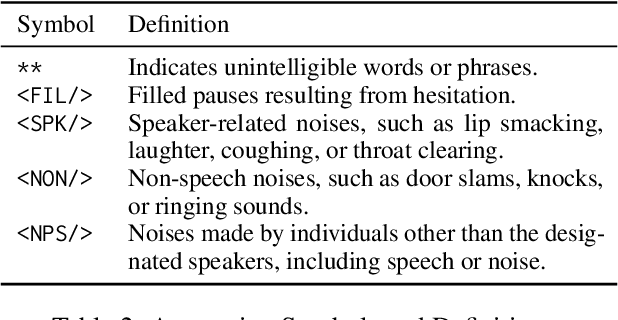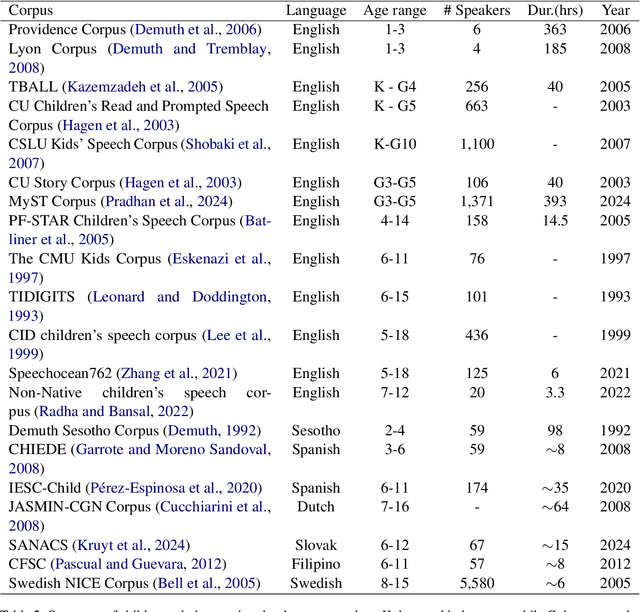Jiabei He
RA-CLAP: Relation-Augmented Emotional Speaking Style Contrastive Language-Audio Pretraining For Speech Retrieval
May 26, 2025Abstract:The Contrastive Language-Audio Pretraining (CLAP) model has demonstrated excellent performance in general audio description-related tasks, such as audio retrieval. However, in the emerging field of emotional speaking style description (ESSD), cross-modal contrastive pretraining remains largely unexplored. In this paper, we propose a novel speech retrieval task called emotional speaking style retrieval (ESSR), and ESS-CLAP, an emotional speaking style CLAP model tailored for learning relationship between speech and natural language descriptions. In addition, we further propose relation-augmented CLAP (RA-CLAP) to address the limitation of traditional methods that assume a strict binary relationship between caption and audio. The model leverages self-distillation to learn the potential local matching relationships between speech and descriptions, thereby enhancing generalization ability. The experimental results validate the effectiveness of RA-CLAP, providing valuable reference in ESSD.
SeniorTalk: A Chinese Conversation Dataset with Rich Annotations for Super-Aged Seniors
Mar 20, 2025Abstract:While voice technologies increasingly serve aging populations, current systems exhibit significant performance gaps due to inadequate training data capturing elderly-specific vocal characteristics like presbyphonia and dialectal variations. The limited data available on super-aged individuals in existing elderly speech datasets, coupled with overly simple recording styles and annotation dimensions, exacerbates this issue. To address the critical scarcity of speech data from individuals aged 75 and above, we introduce SeniorTalk, a carefully annotated Chinese spoken dialogue dataset. This dataset contains 55.53 hours of speech from 101 natural conversations involving 202 participants, ensuring a strategic balance across gender, region, and age. Through detailed annotation across multiple dimensions, it can support a wide range of speech tasks. We perform extensive experiments on speaker verification, speaker diarization, speech recognition, and speech editing tasks, offering crucial insights for the development of speech technologies targeting this age group.
CS-Dialogue: A 104-Hour Dataset of Spontaneous Mandarin-English Code-Switching Dialogues for Speech Recognition
Feb 26, 2025



Abstract:Code-switching (CS), the alternation between two or more languages within a single conversation, presents significant challenges for automatic speech recognition (ASR) systems. Existing Mandarin-English code-switching datasets often suffer from limitations in size, spontaneity, and the lack of full-length dialogue recordings with transcriptions, hindering the development of robust ASR models for real-world conversational scenarios. This paper introduces CS-Dialogue, a novel large-scale Mandarin-English code-switching speech dataset comprising 104 hours of spontaneous conversations from 200 speakers. Unlike previous datasets, CS-Dialogue provides full-length dialogue recordings with complete transcriptions, capturing naturalistic code-switching patterns in continuous speech. We describe the data collection and annotation processes, present detailed statistics of the dataset, and establish benchmark ASR performance using state-of-the-art models. Our experiments, using Transformer, Conformer, and Branchformer, demonstrate the challenges of code-switching ASR, and show that existing pre-trained models such as Whisper still have the space to improve. The CS-Dialogue dataset will be made freely available for all academic purposes.
ChildMandarin: A Comprehensive Mandarin Speech Dataset for Young Children Aged 3-5
Sep 27, 2024



Abstract:Automatic speech recognition (ASR) systems have advanced significantly with models like Whisper, Conformer, and self-supervised frameworks such as Wav2vec 2.0 and HuBERT. However, developing robust ASR models for young children's speech remains challenging due to differences in pronunciation, tone, and pace compared to adult speech. In this paper, we introduce a new Mandarin speech dataset focused on children aged 3 to 5, addressing the scarcity of resources in this area. The dataset comprises 41.25 hours of speech with carefully crafted manual transcriptions, collected from 397 speakers across various provinces in China, with balanced gender representation. We provide a comprehensive analysis of speaker demographics, speech duration distribution and geographic coverage. Additionally, we evaluate ASR performance on models trained from scratch, such as Conformer, as well as fine-tuned pre-trained models like HuBERT and Whisper, where fine-tuning demonstrates significant performance improvements. Furthermore, we assess speaker verification (SV) on our dataset, showing that, despite the challenges posed by the unique vocal characteristics of young children, the dataset effectively supports both ASR and SV tasks. This dataset is a valuable contribution to Mandarin child speech research and holds potential for applications in educational technology and child-computer interaction. It will be open-source and freely available for all academic purposes.
M2R-Whisper: Multi-stage and Multi-scale Retrieval Augmentation for Enhancing Whisper
Sep 18, 2024



Abstract:State-of-the-art models like OpenAI's Whisper exhibit strong performance in multilingual automatic speech recognition (ASR), but they still face challenges in accurately recognizing diverse subdialects. In this paper, we propose M2R-whisper, a novel multi-stage and multi-scale retrieval augmentation approach designed to enhance ASR performance in low-resource settings. Building on the principles of in-context learning (ICL) and retrieval-augmented techniques, our method employs sentence-level ICL in the pre-processing stage to harness contextual information, while integrating token-level k-Nearest Neighbors (kNN) retrieval as a post-processing step to further refine the final output distribution. By synergistically combining sentence-level and token-level retrieval strategies, M2R-whisper effectively mitigates various types of recognition errors. Experiments conducted on Mandarin and subdialect datasets, including AISHELL-1 and KeSpeech, demonstrate substantial improvements in ASR accuracy, all achieved without any parameter updates.
Hawkeye: A PyTorch-based Library for Fine-Grained Image Recognition with Deep Learning
Oct 14, 2023


Abstract:Fine-Grained Image Recognition (FGIR) is a fundamental and challenging task in computer vision and multimedia that plays a crucial role in Intellectual Economy and Industrial Internet applications. However, the absence of a unified open-source software library covering various paradigms in FGIR poses a significant challenge for researchers and practitioners in the field. To address this gap, we present Hawkeye, a PyTorch-based library for FGIR with deep learning. Hawkeye is designed with a modular architecture, emphasizing high-quality code and human-readable configuration, providing a comprehensive solution for FGIR tasks. In Hawkeye, we have implemented 16 state-of-the-art fine-grained methods, covering 6 different paradigms, enabling users to explore various approaches for FGIR. To the best of our knowledge, Hawkeye represents the first open-source PyTorch-based library dedicated to FGIR. It is publicly available at https://github.com/Hawkeye-FineGrained/Hawkeye/, providing researchers and practitioners with a powerful tool to advance their research and development in the field of FGIR.
 Add to Chrome
Add to Chrome Add to Firefox
Add to Firefox Add to Edge
Add to Edge